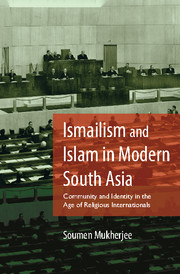 Ismailism and Islam in Modern South Asia
Ismailism and Islam in Modern South Asia Book contents
- Frontmatter
- Contents
- Acknowledgements
- List of Abbreviations
- Glossary
- Note on Transliteration
- Introduction
- 1 The Khoja Ismailis and Legal Polemics Religion and Customs in Nineteenth Century Bombay
- 2 The Howardian Moment Morality, Aryanism and Scholarship
- 3 Pan-Islamism and an Asiatic Spirit Postnational Subjectivities in an Age of ‘Transition’
- 4 The Hazir Imam, Ismailism and Islam in Late Colonial South Asia
- 5 The Importance of Being Ismaili Religious Normativity and the Ismaili International in the Age of Global Assemblages
- Concluding Reflections
- Select Bibliography
- Index
1 - The Khoja Ismailis and Legal Polemics Religion and Customs in Nineteenth Century Bombay
Published online by Cambridge University Press: 23 July 2017
- Frontmatter
- Contents
- Acknowledgements
- List of Abbreviations
- Glossary
- Note on Transliteration
- Introduction
- 1 The Khoja Ismailis and Legal Polemics Religion and Customs in Nineteenth Century Bombay
- 2 The Howardian Moment Morality, Aryanism and Scholarship
- 3 Pan-Islamism and an Asiatic Spirit Postnational Subjectivities in an Age of ‘Transition’
- 4 The Hazir Imam, Ismailism and Islam in Late Colonial South Asia
- 5 The Importance of Being Ismaili Religious Normativity and the Ismaili International in the Age of Global Assemblages
- Concluding Reflections
- Select Bibliography
- Index
Summary
I am a Shia— no a Suni; I was twice married in the Suni form, that is why I know.
Mohamed Dama, 1866The preponderant thrust of the academic scholarship on the theme of production of colonial knowledge and epistemological practices related to South Asia's diverse socio-religious groups and communities tends to highlight the overarching concern to see such communities in terms of clear-cut neat boundaries. This had also, in turn, conditioned the mental world of sections of the colonized to varying degrees. The above quotation, for instance, marks an interesting oscillation between the rival claims of Shia and Sunni consciousness, a question which becomes intelligible particularly in the light of the shifting colonial epistemological concerns since especially the latter part of the nineteenth century. In all likelihood, one would imagine, Mohamed Dama's vacillation was greeted with a roar of laughter. Lest the readers find this to be somewhat facetious, it should be clarified that it was, however, no staged performance, but a moment that captured the key question at stake in a crucial law case in the rooms of the Bombay High Court. The court had assembled to decide the exact sectarian status of the Khojas and the position of the Aga Khan within that community. Recognized as one of the key founding figures of the Sunni Khoja jamaat in Bombay, the witness Mohamed Dama was impelled to think – probably for the first time in his life in front of an audience – about his identity along a specific sectarian line as laid down and required by the colonial judicial apparatus. Justice Arnould later adjudicated that the Khojas are Shia Muslims with Aga Khan I – who had in the 1840s arrived in British India after fleeing from Qajar Persia – at the apex as their spiritual guide, the Imam.
Interestingly, however, at the levels of individual consciousness and religious sensibilities, and above all in specific matters of private law (intestate inheritance, in particular), antithetical trends defying wider processes of standardizations persisted among the Bombay Khojas even after this landmark judgement.
- Type
- Chapter
- Information
- Ismailism and Islam in Modern South AsiaCommunity and Identity in the Age of Religious Internationals, pp. 30 - 52Publisher: Cambridge University PressPrint publication year: 2016


